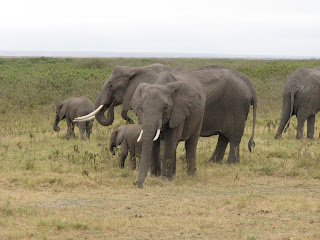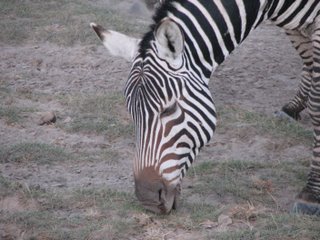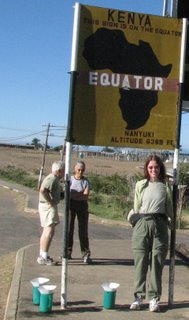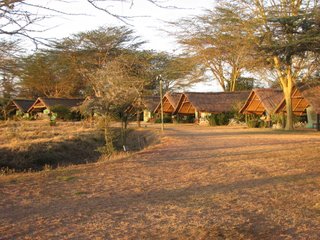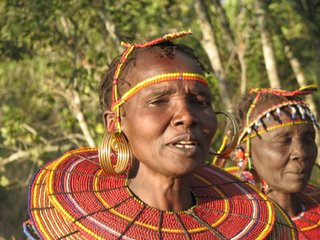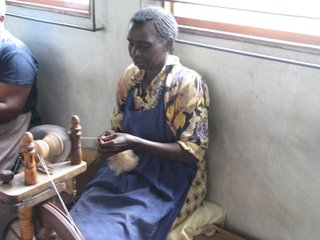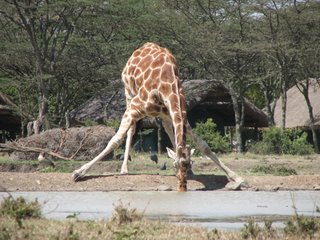
We wake up to find that it is totally clouded-in, and still drizzing. I hope we will see some game, and not skid of the cliff! As it turns out the road down is steep, but not as scary as I feared – there was always a little bit of earth between the edge of the road and the abyss, so even I with my fear of heights didn’t think we were going to fall off the edge after all. I was certainly glad when we made it down, however!
Once down on the crater floor, it’s not as cloudy as it was above, and the drizzle has stopped. We see a couple of lions in the grass, but it’s really a tease – they are so camouflaged that we can barely make them out. I hope we’ll get a better view later. We stop to view some birds. I’m impatient – I have cats to see! Roman says that morning is the best time to see cats, and I really don’t want to waste time on yet another weaver or bustard. So I get sneaky and say “let’s go” in Swahili: “twende tafadhali” [sp?], and it works! Roman starts the engine and we move on. That was even better than learning how to say ‘where is the bathroom?’
We see a cluster of vehicles ahead, and head toward them. It’s the modern equivalent of watching for vultures circling. And indeed, we see 2 lions eating at a kill, with jackals waiting at a distance. A couple more lions are nearby, and finally we notice the big male off on the right. As we focus on the scene, we realize there are more and more lions: 5,6,7,8! And then off to the left, another female guarding a second kill. Every once in a while she looks over at the rest of the pride, as if to say: “dinner’s ready!” The other lions slowly start walking that way, so we shift our position to the second kill.
 As more and more lions amble over, they crowd in until there is a veritable pile of lions obscuring the kill. They are not that hungry, having already feasted at the previous kill. Two quickly go in search of an after-dinner drink – a small mud puddle right in front of the vehicle ahead of us. From our angle, all we can see is 2 tails stretching out from the side of the land rover. There are still a few lions at the kill, and suddenly the male appears from the rear – we get a great view of him. He approaches too fast for me to un-zoom my camera, so my last shot is an extreme close-up (which has been very satisfactory at scaring my friends at home :o ). Then he proceeds to wend his confident way up the line of vehicles, spraying the tires as he goes. He makes it clear who is boss.
As more and more lions amble over, they crowd in until there is a veritable pile of lions obscuring the kill. They are not that hungry, having already feasted at the previous kill. Two quickly go in search of an after-dinner drink – a small mud puddle right in front of the vehicle ahead of us. From our angle, all we can see is 2 tails stretching out from the side of the land rover. There are still a few lions at the kill, and suddenly the male appears from the rear – we get a great view of him. He approaches too fast for me to un-zoom my camera, so my last shot is an extreme close-up (which has been very satisfactory at scaring my friends at home :o ). Then he proceeds to wend his confident way up the line of vehicles, spraying the tires as he goes. He makes it clear who is boss.Another lion starts to cross the road, then lies down right in the middle, effectively blocking traffic. We can’t help but think he is disdainfully amused. More and more vehicles congregate. The scene rays out from the lions in the road, surrounded by the various land rovers, with the kill slightly off to the side. Then I suddenly notice that the other lions have now circled around us --we are surrounded by lions! It’s a good thing they are not hungry. My face keeps alternating between open-mouthed awe and sheer happiness. My roommate calls that my happy cat face. She gets that way when she sees elephants.
Eventually the lions disperse and we do too. After seeing more wildebeest (a darker color than we have seen before) we also see a zebra parade, and a handful of warthogs.
We head over to a curve in the road where a few vehicles have assembled, and try to figure out what they are staring at. Their heads are pointing in the direction of a trio of warthogs, but we can’t imagine what is so fascinating. Roman is the first to spy the cheetah hidden in the tall grass. At first I can’t see it at all, but it raises its head, which helps. Once I get a fix on the position, I see the spots faintly through the grass, even when his head disappears again. But then I stare so hard I’m not even sure I’m seeing anything.
Luckily we get a better chance later, as Roman spies a cheetah seated in the grass. I couldn’t see it at first, so he told us to look for the stick. Then I saw it – it really did look like a stick, or a long neck poking up from the grass. I couldn’t figure out how that shape could be a cheetah. I wasn’t familiar with those narrow shoulders and long lean body. Finally I got a closer view through my binoculars and realized I was looking at his whole torso. It’s funny how much you have to train your eyes to see the animals.
We go to the picnic area for lunch and bathrooms, eating in the land rover because the kites are attracted to food, and can actually be dangerous. I’m getting antsy again as time passes – we don’t need to spend so long eating a dry little sandwich and cold chicken leg. We could be seeing animals and instead we are just milling about. But that’s just my NYC impatience talking – I’m very task oriented, and right now my agenda is to see game. We get going again and all is fine.
 Later in the afternoon we get a real treat, with an exquisite performance by two cheetah brothers. They walk up the road, approaching us with casual unconcern. We watch with delight, and whisper our desires – “oh, I wish the back one would hurry up so I could get them both in frame (done). I wish they would cross over there so we could see their profiles (done). I wish they would turn their head so I could see their face (done). I wish they’d walk to the top of the hill so I could get a silhouette (done). Never has a subject posed more obligingly. They watched some distant gazelles, but unfortunately we had more interest in a chase than they did, so nothing happened.
Later in the afternoon we get a real treat, with an exquisite performance by two cheetah brothers. They walk up the road, approaching us with casual unconcern. We watch with delight, and whisper our desires – “oh, I wish the back one would hurry up so I could get them both in frame (done). I wish they would cross over there so we could see their profiles (done). I wish they would turn their head so I could see their face (done). I wish they’d walk to the top of the hill so I could get a silhouette (done). Never has a subject posed more obligingly. They watched some distant gazelles, but unfortunately we had more interest in a chase than they did, so nothing happened. After the delicious tension of the cheetahs, we turned to comic relief at the hippo pool. The hippos are crowded side by side, with a couple further away at each end. We are amused by the splashing, which happens via no visible cause. The hippos off by themselves at the end have a tendency to roll instead of splash. I take a picture of one with a foot sticking up in the air, and realize that when I get the picture back I’ll have no idea what it is.
After the delicious tension of the cheetahs, we turned to comic relief at the hippo pool. The hippos are crowded side by side, with a couple further away at each end. We are amused by the splashing, which happens via no visible cause. The hippos off by themselves at the end have a tendency to roll instead of splash. I take a picture of one with a foot sticking up in the air, and realize that when I get the picture back I’ll have no idea what it is. As we approach the exit and wind through the forest area, we are all looking for an elephant for Idelle – it is her favorite animal (other than gerenuk) and it is funny that we have seen a single one in the crater (except for one far in the distance, which doesn’t really count.) Just as it is almost too late we pass one under a tree, about 20 yards from the road. His tusks are huge, as long as his trunk, and the guide figures he’s about 60 years old, and probably on his last set of teeth, with only a short lifespan left to go. We stare soberly as he says that, realizing that there is no way to delay the normal process of nature.
The full list of animals we saw included golden jackal, wildebeest, lions (including a pride of 9 at 2 different kills), greater flamingo, lesser flamingo, Thompson’s gazelles, Egyptian geese, cheetahs, kori bustard, hartebeest, rufous tailed weaver, ostrich, black rhino (in the distance), warthogs, spotted hyena, grants gazelle, silver backed jackal, cape buffalo, sacred ibis, hadada ibis, hippopotamus, grey heron, crested crane, secretary bird, elephant, olive baboons.
The trip back up to the rim is steep and bumpy, but again not as bad as I was afraid of. But the cumulative effect of these bumps has taken a toll on my back, and I’m in some pain after we get to the hotel. I stop by reception on the way in and schedule a massage. I really need to do something or I won’t be in shape to go tomorrow. So after the excellent massage I take a hot shower, and pop some aleve, and apply some bio-freeze, and then join the group for cocktails. 5 muscle relaxants in a row has to be a record, and it works. I’m ok in the morning.











